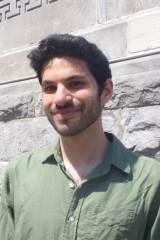Meet some of the 2017 recipients of Canada’s most prestigious graduate awards, exemplifying academic excellence across the full range of disciplines.
Jamilah Abusarah, Microbiology and Immunology
 Validation of the Antigen Presentation Capacity of Mesenchymal Stem Cells
Validation of the Antigen Presentation Capacity of Mesenchymal Stem Cells
Bone marrow-derived mesenchymal stem cells (MSCs) are multipotent stromal cells that have the capacity to differentiate into a variety of cell types. Due to their unique properties, MSCs have been often exploited for tissue repair, delivery of therapeutic proteins and for enhancing stem cells engraftment. In addition to their complex immunomodulatory features which give them the ability to either suppress or stimulate immunity, MSCs did also prove to have the capacity to act as an antigen presenting cells when treated with INFγ. My project focuses on studying the efficacy of MSCs as antigen presenting cells.
To receive the very prestigious Vanier Canada Graduate Scholarship is an incredible honor. This award will have a great impact on my Ph.D. and on my future career, not strictly in financial term but in focusing my research activities more precisely as well. It is my fervent wish to give back to the academic community, and to the greater community, as well, as much as it has given me. I will forever be thankful.
Daniel Almeida, Integrated Program in Neuroscience
 The neuroepigenetic link between childhood abuse and suicide: a single-cell type sequencing approach
The neuroepigenetic link between childhood abuse and suicide: a single-cell type sequencing approach
Early life is characterized by a heightened sensitivity and ability of the brain to change in response to the developing child’s environment. Adverse experiences during this period therefore, have the potential to lead to negative psychological outcomes all the way into adulthood. In fact, it is estimated that approximately 30% of adult mental illnesses may be due in part to a history of severe childhood abuse. Our goal then is to understand the precise molecular changes that occur in the brain as a result of childhood abuse and how these alterations might explain adult depression and suicidal behaviour. Studying epigenetic modifications is an interesting way to address this question as they contribute to brain development and plasticity and are responsive to environmental experiences.
In this project, we plan to investigate epigenetic modifications and transcriptomic differences across the entire genome from cortical brain tissue of subjects who were abused as children and died by suicide as adults. In the past, researchers asking similar questions ignored that the brain is composed of a mixture of different cell types that can be differentially affected by an individual’s life experiences. Our project advances the field by using methods that allow us to study childhood abuse driven epigenetic and transcriptomic changes in a single cell type of the brain. As a result, these studies will allow us to specifically identify systems in the brain that may be biologically disrupted by childhood abuse. The practical implications of this work are to understand whether these molecular alterations can serve as predictive biomarkers of suicide risk and if they are reversible through specific pharmacological therapies. By doing so, we hope to reduce the risk that childhood abuse contributes to suicidal behaviour and decrease the rate of 800,000 worldwide deaths per year due to suicide.
Danielle Rice, Psychology
 Making accurate depression screening and assessment a reality for Canadians: using individual patient data meta-analysis to personalize risk estimates
Making accurate depression screening and assessment a reality for Canadians: using individual patient data meta-analysis to personalize risk estimates
As a psychologist trainee, I am acutely aware of the large number of Canadians with depression that do not receive adequate care, despite the availability of effective treatments. Across the lifespan, depression is associated with reduced quality of life, poor prognosis in the context of other medical problems, increased risk for suicide, and increased mortality. Effective interventions to reduce the burden of depression exist, but most Canadians with depression go unrecognized and do not receive adequate care. My research project includes the first sufficiently large database that incorporates individual patient characteristics (e.g., age, sex, medical diagnosis) into estimates of whether someone has depression. My project will allow healthcare professionals to determine patient-specific probabilities for depression, rather than using a “one-size-fits-all” approach. This work will facilitate more informed clinical decision-making than can be achieved using current methods, and will help ensure that people with depression receive accurate and timely interventions. In addition to research on depression, my doctoral work includes projects to improve the mental health of individuals with chronic health conditions and their caregivers.
Nadia Sourial, Family Medicine
 Impact of provincial primary care reforms on the management of persons with Alzheimer's disease and on associated health care use and cost
Impact of provincial primary care reforms on the management of persons with Alzheimer's disease and on associated health care use and cost
Alzheimer’s disease is a devastating illness for patients and their families. It robs those affected of their memory and independence and eventually leads to death. As the population in Canada is aging, the number suffering from Alzheimer’s will double to 1.4 million with a projected health care cost of $300 billion in the next 20 years. To address this crisis, Canadian provincial governments have implemented reforms to provide better care to patients with Alzheimer’s by increasing the role of family doctors. By doing so, governments hope to also reduce the burden of this disease on our health care system. While these publicly-financed reforms have been ongoing for several years, there has been no systematic study to assess whether they have been effective.
My study, part of a Canada-wide research program on Alzheimer’s disease, will be the first to provide this information. I will examine the impact of these reforms by analyzing government data on all patients with Alzheimer’s disease in Ontario and Quebec over the last two decades. These datasets will allow me to access almost 2/3 of the Canadian population with Alzheimer’s disease and study the trends in care and health service use before and after the reforms. Using innovative statistical models, I will examine whether more people with Alzheimer’s are being diagnosed and regularly followed by family doctors. I will also determine whether the reforms have decreased the number of emergency visits, hospital stays and nursing home care needed for patients with Alzheimer’s. My analysis will give provincial health officials, researchers and Alzheimer’s patient groups much needed data on what parts of the reforms are working and what needs to be improved. Overall, my study will help provinces achieve a sustainable and effective health care system capable of meeting the needs of patients and families affected by Alzheimer’s disease, ultimately leading to a better quality of life for this vulnerable population.
Suzanne van der Veldt, Integrated Program in Neuroscience
 The effect of prenatal maternal immune activation on the functionality of the mesolimbic system in adulthood: relevance to schizophrenia
The effect of prenatal maternal immune activation on the functionality of the mesolimbic system in adulthood: relevance to schizophrenia
In life, I strive to positively impact people’s health and wellbeing on a large scale, and I want to do this in what I believe to be the most exciting and dynamic field in science: Neuroscience. It is an incredibly exciting time to be a neuroscientist, as strides forward have been made that could not be imagined only two decades ago. Building on my undergraduate training in psychology and cognitive neuroscience, I continuously aim to fortify and diversify my scientific skills, in order to study the topic I am most interested in: motivation. Motivation can be described as the willingness to work for a preferred outcome, over something that is easier obtainable, but less preferred. In my research, I wish to contribute to our understanding of normal and abnormal neuronal circuit dynamics in the brain, using the powerful suite of in-vivo recording and optogenetic stimulation techniques that have been invented in the last decades in neuroscience.
Schizophrenia is a psychiatric disorder that affects up to 2% of the global population and is characterized by a range of complex behavioral abnormalities, including a debilitating deficit in reward processing and motivation. Currently, a basic understanding of the underlying pathophysiology of the disorder is lacking, and therefore a shortage of tools for curative treatment or prevention strategies. Epidemiological studies strongly suggest exposure to maternal inflammatory activation as an environmental factor in the development of a range of psychiatric disorders, including schizophrenia, depression and bipolar disorder, all characterized by a dysfunction of reward processing.
Therefore, in my PhD project, I investigate reward processing in both healthy, as well as prenatally challenged offspring, in order to determine the extent to which maternal infection during critical stages of neuronal development alters the brain wiring of areas of key importance for reward processing. This study will be an important step towards understanding the development of SCZ. I am thrilled to make my next steps as a PhD student and in the future be able to move the field onward.
Keena Trowell, Mechanical Engineering
 High-Temperature and High-Pressure Prototype Metal-Water Reactor for Hydrogen Production
High-Temperature and High-Pressure Prototype Metal-Water Reactor for Hydrogen Production
In the fight against climate change, new fuels are needed to replace fossil fuels which emit greenhouse gases (GHGs). GHGs are the main component of human-caused climate change. Renewables and batteries are part of the solution however they cannot meet all of society’s energy needs. Neither of these technologies has the power density needed in industries like construction, agriculture, shipping or flight. Power density refers to how quickly stored energy can be released. One option for replacing fossil fuels is hydrogen. Hydrogen is an excellent fuel because, when burned, it delivers high power density while producing no GHGs. The challenge with hydrogen as a fuel is that hydrogen is difficult and dangerous to store and transport.
The goal of my PhD research is to develop a system which uses metal-water reactions to deliver hydrogen-on-demand. The hydrogen created can be burned to power an engine or fed directly into a fuel cell. These reactions have an added advantage in that they are exothermic – that is, they release heat – and this heat can also be used directly for power. The ability to create hydrogen-on-demand would vastly improve the safety and convenience of this clean fuel.
A hydrogen-on-demand system would, of course, require hydrogen to be produced very quickly. We know that as the reaction temperature increases so does the rate of hydrogen release. Thus, high-temperature metal-water reactions may hold the key to on-demand hydrogen. My PhD research project will lead to a better understanding of high-temperature metal-water reactions and how to maximize the output of these reactions. This knowledge will broaden the possible ways hydrogen could be used as a fuel and improve the safety of these systems.
Jose Mauricio Gaona, Law
 The Unwelcome Refugee - An Introspective Analysis on National Security Interest, Modern Forced Migration, Refugee and Asylum Protection
The Unwelcome Refugee - An Introspective Analysis on National Security Interest, Modern Forced Migration, Refugee and Asylum Protection
Today, there are 21.3 million refugees worldwide, of which more than 10 million are children. Every year, thousands of refugees across the globe die while fleeing the conflicts of modern civilization. Those unable to attain their intended destination are placed for months, and even for years, in refugee camps located in poor and developing countries facing the most precarious humanitarian conditions. Those with the means to pay smugglers to cross the borders of the 'free world' face discrimination, assaults and, if caught, detention. This is what I call the refugee paradigm: Escaping persecution to face prosecution, indifference, and violence. As nations confront a defining test of values and the limits of the international legal system are gradually exposed, a dangerous amalgam of populism, politics, and public policy portrays refugees as criminals, terrorists, social cost, and threats to national security and cultural identity. My research disrupts this narrative, advances a different approach to the problem, and proposes a comparative, empirical, and interdisciplinary analytical model aimed at deflecting circular 'solutions' and breaking the paradigms that dilute reason, reality, and humanity.
Jonathan Wald, Anthropology
 Cultivating Virtuous Futures: Brazil's Regulation of Agricultural Biotechnology
Cultivating Virtuous Futures: Brazil's Regulation of Agricultural Biotechnology
My research investigates the transformations of moral thinking occurring in the regulation of biotechnological agriculture in Brazil. As concerns about anthropogenic climate change grow, Brazil has sought the means to produce greater quantities of biofuel to provide an energy alternative to petroleum. This situation provides a window into a conflict where classical ways of thinking about morality are put into question. What priorities ought to orient these new technologies? What counts as “nature” once geologists have announced “the Anthropocene,” the age where humans are a geological force? What counts as “technology” when it seems that life itself might be malleable? The new realities pose significant challenges to older ways of thinking about morality. To gain better clarity on how some are addressing these concerns, I will be observing the day-to-day work of environmental regulators in the Brazilian state of Minas Gerais.
Jacob Vogel, Integrated Program in Neuroscience
 Network modeling of Alzheimer's disease progression: Using multimodal neuroimaging to test whether Alzheimer's pathology spreads through existing brain networks
Network modeling of Alzheimer's disease progression: Using multimodal neuroimaging to test whether Alzheimer's pathology spreads through existing brain networks
Amyloid-β (Aβ) plaques and tau tangles are pathologies that are present in large concentrations in the brains of patients with Alzheimer’s disease (AD). Additionally, AD is also characterized by loss of large amounts of brain tissue. Neuroimaging techniques allow scientists to measure these disease markers in living humans. By combining information from several different types of neuroimaging measures, complicated relationships between normal brain processes and disease process can be better understood. These “multimodal” analyses have led recently to the hypothesis that disease processes spread from one part of the brain to another over time, and that the pattern of spread is not random. Specifically, brain regions that are more affected by different pathologies also have a greater number of physical connections in the brain.
My research uses multimodal computational modeling to try to predict the ordering of biological events that leads to dementia, using information about the natural architecture of the brain. One such model is the Epidemic Spreading Model (ESM), which was developed in Alan Evan’s lab by Yasser Iturria-Medina. The model identifies an “epicenter”, or a starting point of disease spread, and simulates where and when pathological processes will move from this epicenter to other brain regions, based on how connected the regions are to one another. My research will extend the ESM to neuroimaging techniques that measure where tau and brain tissue loss occur. Applying the ESM to these disease markers will help us empirically test, a) do these disease markers indeed spread through connected brain regions over time, b) if so, which specific brain networks are the most vulnerable and when, c) what areas are affected first. Additional research will use supervised and unsupervised machine learning techniques to better characterize the spatial patterning of different disease biomarkers in order to understand how these biomarkers interact with one another, and how their evolution influences clinical outcomes.
Ryan Lowe, School of Computer Science
 Building Dialogue Systems with Artificial Neural Networks
Building Dialogue Systems with Artificial Neural Networks
Building systems that can have natural and coherent conversations with humans has long been regarded as one of the cornerstone problems in artificial intelligence (AI). Such systems are called dialogue systems, as they are designed to have a dialogue with a human. Most current approaches to building dialogue systems rely on hand-crafted rules or very specific types of data, which makes them suitable only for narrow domains such as restaurant recommendation or bus schedule information. When these systems are applied in larger, more general settings, they usually fail as their hand-crafted nature makes them unable to learn efficiently in new environments.
For my PhD research, I will investigate the use of artificial neural networks (ANNs) to build dialogue systems from large amounts of conversational data. ANNs are models that are loosely inspired by the human brain, and are composed of layers of artificial neurons. ANNs now achieve state-of-the-art performance in many areas, including recognizing objects in images, translating text, transcribing speech, and analyzing medical images. Dialogue systems built with ANNs can be applied to much more general domains than traditional approaches, as they require significantly less manual engineering and can easily be re-trained for a new task.
My research will tackle some of the current challenges in applying ANNs to dialogue systems; I will investigate improved training procedures for these models, derive new ANN systems that generate more diverse responses, and establish new benchmarks for evaluating dialogue systems in general. This will result in dialogue systems that are more flexible and useful in practice.
Sarah Jane Kerr-Lapsley, Integrated Studies in Education
 Pedagogical Communities of Practice: A Case Study in Canadian Holocaust Education
Pedagogical Communities of Practice: A Case Study in Canadian Holocaust Education
Social studies and history teachers frequently supplement their curriculum with external resources and cultivate relationships with the organizations and initiatives providing those resources, but these communities of practice are not well understood. This research seeks to understand how Canadian social studies teachers use resources from museums and community organizations to teach their students about the Holocaust, an event that is regularly referenced when teaching everything from World War II, to contemporary human rights issues, to the dangers of intolerance and racism. This preliminary study will explore the approaches used by public high school teachers in Vancouver and Calgary to incorporate resources from local Holocaust education centres into their classes.
Understanding how these resources are used in Canadian classrooms will help us develop new resources, improve existing ones, and better connect teachers to them. The study will provide detailed evidence-based recommendations for teachers, community organizations, and teaching education programs, alongside a conceptual framework for understanding pedagogical communities of practice in different provincial curriculum contexts. This work will also lead to the development of workshops and other professional development opportunities for educators who want to broaden and strengthen their teaching methods. Future research projects will explore these other contexts, with the goal of improving both the development and distribution of teaching and learning resources in Canada, and training for educators who use these external resources to expand their students’ understanding of class material.
Marco Kassis, Electrical and Computer Engineering
 Parallel Time-Domain Analysis of Reduced Order Power Delivery Networks
Parallel Time-Domain Analysis of Reduced Order Power Delivery Networks
The modern microsystems industry faces key challenges including signal and power integrity, both from design and design automation perspectives. As other system elements have become increasingly optimized, delivering clean and stable power supply through power delivery networks (PDNs) has become a notable limiting factor in design. Given the global paradigm shift towards multicore computing rather than higher clock frequencies, we use that to offer a contemporary solution to the power delivery research question.
Simulation of the large and complex PDNs is very timely and computationally demanding. The methodology we propose for modelling PDNs starts with a segmentation process. This divides the system into many, independent, smaller-size models, enabling all subsequent steps to be done in parallel. We then use mathematical schemes of model order reduction (MOR) to reduce the size of each of the systems simultaneously. We hence perform the simulations swiftly at a much reduced computational cost. The research question lies in increasing the complexity of the PDN model, where segmentation and MOR become less straightforward.
Emily Moore, Psychology
 Perfectionism and Goal Progress: An Investigation into the Mediating Factors
Perfectionism and Goal Progress: An Investigation into the Mediating Factors
A variety of factors can impede or promote goal progress, a process that is crucial to many aspects of life. Research has identified self-critical perfectionism as a notable factor that impedes goal progress and personal standards perfectionism as an important factor that promotes it Nevertheless, the process by which self-critical perfectionism undermines goal progress and personal standards perfectionism bolsters it remains unclear. Much is known about the associations between both types of perfectionism and other factors, but little research has focused on whether these factors are influential in the pathway that leads from perfectionism—adaptive versus maladaptive—to goal progress—increased or decreased. An important research objective in this area is to understand the mediating factors that determine whether perfectionism impedes or promotes goal progress.
In my graduate research program, I will utilize multi-wave longitudinal methods to improve our understanding of the process by which the two types of perfectionism—adaptive and maladaptive—impact goal progress. My work will also strive to determine whether the course can be altered through intervention. This research is important because it could improve goal progress for diverse populations in a wide range of domains, such as education, athletics, business and personal life. My graduate research will contribute to the field by determining the impact, mediators and malleability of the relationship between perfectionism and goal progress.
Joanne Murray, Law
 The Irreducible Core of Administrative Law: A Model for Understanding the Nature of Judicial Review of Administrative Action.
The Irreducible Core of Administrative Law: A Model for Understanding the Nature of Judicial Review of Administrative Action.
Judicial review is when the courts examine decisions made by public officials in the executive branch of government. Courts have the power to invalidate these decisions, and usually do so when they conflict with power-granting statutes or constitutional rights and values. Yet public officials are often given the explicit discretion by Parliament to make certain decisions. The decision is to be made by them. Do courts have the authority to review the decisions of public officials despite a clear mandate from Parliament? If so, when is intervention of this kind legitimate? Exploring these questions requires close consideration of the relationships between foundational principles in modern legal systems, such as democracy, the rule of law, politics and legality. In a global context of growing crisis and insecurity, it is critical that public actors and judges engage in dialogue and that the public is aware of the limits of government and judicial action.
In addressing the justification for judicial review, my research builds on Professor Evan Fox-Decent’s ‘fiduciary model’ of the administrative state. Fiduciaries (and trustees) are generally private actors with certain discretions. They must exercise this discretion loyally. That means acting for the benefit of those for whom they hold the discretion (the beneficiary). Courts supervise these decisions. In this context, trusts have an ‘irreducible core’, which includes duties of loyalty and the supervisory jurisdiction of the court. My research develops this concept of the ‘irreducible core’ to re-consider fundamental questions concerning the legitimacy of court intervention in decision-making. In this way, my research transplants the ‘other-regarding’ nature of both the duty of loyalty and the supervisory jurisdiction of the court into administrative law.
 This work is licensed under a
This work is licensed under a